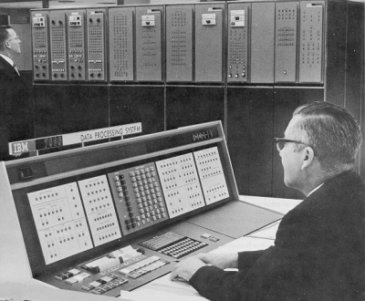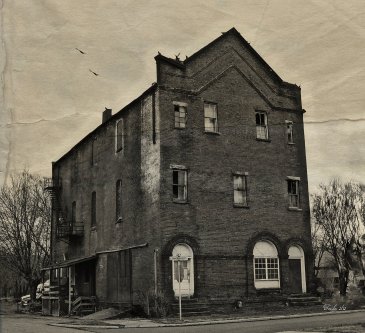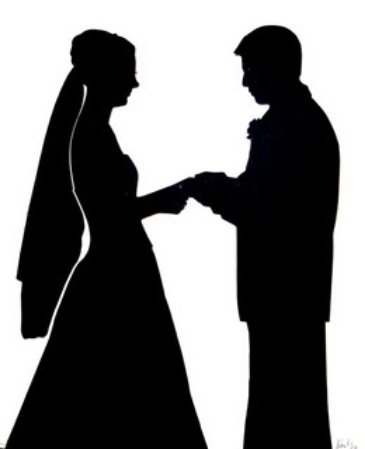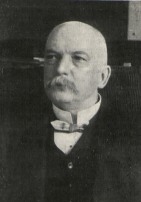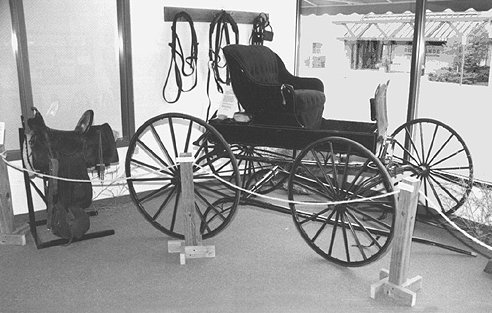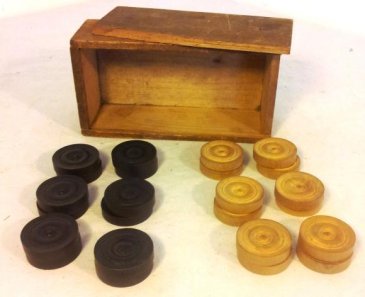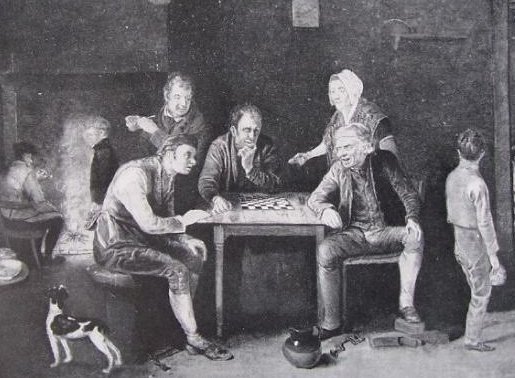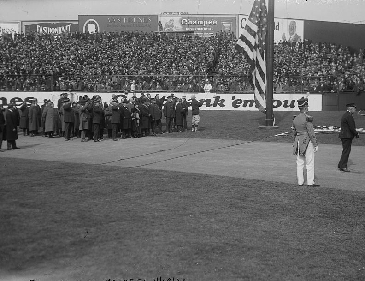The Checker Maven
The World's Most Widely Read Checkers and Draughts Publication
Bob Newell, Editor-in-Chief
Published each Saturday morning in Honolulu, Hawai`i
Contests in Progress:
Pages: «Prev
|
1 |
2 |
3 |
4 |
5 |
Next»
Happy New Year 2016
This column will appear on January 2, 2016. You've had Friday off from work, most likely, and you've hopefully shaken off any New Year's Eve excesses, had your fill of football games, and are ready to settle down to a little checkers to get the new year rolling.
Today we present a full game based on the Single Corner opening. It comes from master play from an earlier day. There are two parts to our checker problem. First, here's the whole game, without commentary.
11-15 22-18 15x22 25x18 12-16 29-25 9-13 25-22 16-20 24-19 8-11 19-16 4-8 16-12 11-16 18-14 10x17 21x14 6-10 22-17 13x22 26x17 8-11 30-25 11-15 23-19 15x24 28x19 16x23 27x18 1-6 25-21 10-15 18x11 7x16 31-27 16-19 32-28 2-7
BLACK
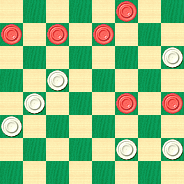 WHITE
White to Play, Black Wins
WHITE
White to Play, Black Wins
W:W28,27,21,17,14,12:B20,19,7,6,5,3
When originally published, this was correctly left as a Black win (with White to play). Now, the first part of our problem is to demonstrate the win. If you're any sort of advanced player, you'll be able to do this easily enough. If you're a non-expert, it's an excellent exercise in winning a won game.
The second part of the problem is much harder. Can you go back into the game and find out where White went wrong? Again, experts will realize quickly that this line in the Single Corner is not so common. But there's one move that can definitely be said to lose. Can you correct the play?
You'll need to get out your board for this one; we recommend that instead of a computer, as we don't want you to be tempted to simply look at computer analysis.
Will this start the year off right? Only you can say. See how you do and then click on Read More to see the solutions.
[Read More]
Marvin and the Academic
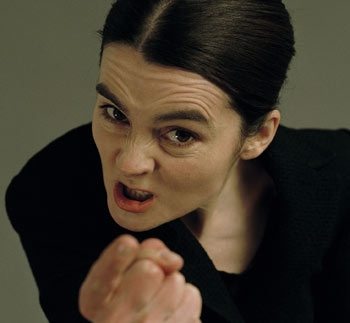 Dr. Hillary Silverfish
Dr. Hillary Silverfish
Dr. Hillary Silverfish stared and pointed at Marvin, the intensity of her gaze frightening and chilling. Close-cropped dark hair added to the effect. This was one tough customer.
"Prepare to die," she hissed.
Marvin J. Mavin, sitting across the checkerboard from Dr. Silverfish, pretended not to be intimidated, but if the truth be known, he was terrified. Even though Marvin was team captain for the Detroit Doublejumpers and one of the National Checker League's top players, Dr. Silverfish was a formidable opponent, and her patented stare was one of her most feared weapons.
 Marvin J. Mavin
Marvin J. Mavin
The Doublejumpers were playing an exhibition match with San Diego Liberal Artiste University's faculty team. Dr. Silverfish, not surprisingly, was head of the Psychological Arts Department, and lead the checker team. She often boasted about how she could have been a top pro player, "but I have a Ph.D., you know, and it's really my duty to teach the next generation of students."
"Ph.D., Schmee-h D.," Marvin had remarked, with characteristic impoliteness, when the local press asked him what he thought about his opponent, "You still got to make the right moves to win the game." At that point Marvin excused himself and went off to find himself a beer, which in San Diego wasn't particularly difficult.
But once again, Marvin had found himself not just a beer, but a few beers, and so at the start of the match he was, shall we say, at less than a hundred percent, and Dr. Silverfish was not one to fail to exploit a weakness.
"Who you starin' at, Silverfish?" said Marvin in his most irritating tone. "We'll see who's going to die, you old bookworm!"
Dr. Silverfish cleared her throat. "I don't respond to comments by inebriated louts," she said. "I just crush them, like this."
To Marvin's amazement, Dr. Silverfish picked up the empty soda can sitting at her left and, with one hand, squeezed it until it split along the seams.
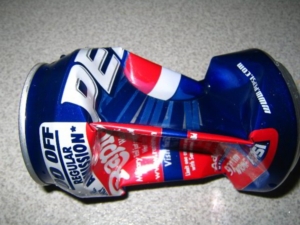
Marvin repressed a shiver, hoping Dr. Silverfish hadn't seen. But she didn't miss much.
"You should be scared, maggot," she said, but before she could go on, the referee blew his whistle, signalling the start of the match. Marvin lead off with the Black pieces, and Dr. Silverfish had the White.
"Your tricks don't fool me," Dr. Silverfish said. "I know a poor move when I see one."
| 2. | ... | 22-18 |
| 3. | 15-22 | 25-18 |
| 4. | 10-15 | |
"Drinking doesn't help you play better, little man."
| 4. | ... | 18-11 |
| 5. | 7-23 | 27-18 |
| 6. | 12-16 | 29-25 |
| 7. | 5-9 | |
(This is the end of of the KingsRow opening book. White has an advantage due to the odd line played by Black.)
(Good, but 32-27 would have been really strong here; White still has a definite edge.)
| 8. | 16-20 | 24-19 |
| 9. | 6-10 | 18-15 |
(30-25 would have been hard to draw against. White now has just a narrow advantage.)
(10-14 loses after 28-24.)
(A poor move allowing only the narrowest of draws. 4-8 was correct.)
Dr. Silverfish smiled. "Your poor play continues," she said, "and now I will finish you off."
Indeed, Marvin was fidgeting in his chair, as he always did when he was in a tough spot.
(32-27 would have kept the lead. The game is now even.)
Marvin exhaled. "Well, there, Silverfish, you ain't as good as you think you are. You missed your chance and you ain't getting another, not against ole Marvin."
WHITE
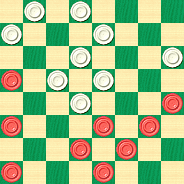 BLACK
Black to Play and Draw
BLACK
Black to Play and Draw
B:W32,31,28,26,23,21,19,18,15:B20,13,12,10,9,7,6,4,2.
How will Marvin save the game? Can you stand up to Dr. Silverfish's terrifying stare and find the solution? Don't panic; work it out and then click on Read More to see the solution and the conclusion of our story.
[Read More]
The Computer Says
"Natural" moves. "Familiar" positions. Expert players understand these concepts and apply them to great effect. But powerful computer engines sometimes turn these ideas on their heads. While the human expert relies on a combination of analysis and the application of principles, computer engines can analyze very deeply and find unexpected things. This is sometimes called "concrete" analysis, and it's changed the world of chess as well as the world of checkers.
Today we'd like to present a small investigation into the Double Corner opening, looking at a move that's sometimes taken, even if it's not so good. Here's the play.
| 1. | 9-14 | 22-17 |
| 2. | 11-15 | 24-19 |
This move is seen from time to time in amateur games. It is decidedly inferior to the preferred 25-22, but is it a probable loss? Maybe. Let's see how the KingsRow computer engine projects subsequent play.
| 3. | 15-24 | 28-19 |
| 4. | 8-11 | 25-22 |
| 5. | 11-15 | 27-24 |
| 6. | 5-9 | 17-13 |
| 7. | 4-8 | 29-25 |
| 8. | 7-11 | 31-27 |
| 9. | 1-5 | 23-18 |
| 10. | 14-23 | 27-18 |
| 11. | 9-14 | 18-9 |
| 12. | 5-14 | 22-17 |
The critical point. Here the computer chooses the "unnatural" 21-17, pitching a man and accepting a loss in the interest of prolonging play, as the computer will often do. But what if White tries to hold things together with 22-17 as listed above?
| 13. | 11-16 | 26-23 |
| 14. | 16-20 | 32-27 |
White continues to try to save a man but is now hopelessly lost.
WHITE
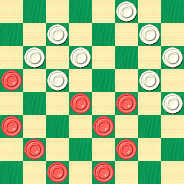 BLACK
Black to Play and Win
BLACK
Black to Play and Win
B:W30,27,25,24,23,21,19,17,13:B20,15,14,12,10,8,6,3,2.
The rest is really pretty easy, and we're sure you'll figure it out. Have your say, then see what the computer says by clicking on Read More.
[Read More]
An Exhibition Match
Marvin J. Mavin was in Bellman, Ohio, the home of the National Checker League, for a special gala event to benefit the NCL Youth Fund. Various other top professionals would be playing simultaneous exhibitions, giving lessons and demonstrations, and analyzing games submitted by attendees. But the featured event, the real headliner, would be a single game match-up between Marvin and the President of the NCL, Elan Hallmion.
 Marvin J. Mavin
Marvin J. Mavin
President Hallmion was a former top-ranked professional player; some thought he was every bit as good as Marvin. But there was more to the story.
 Elan Hallmion
Elan Hallmion
The truth is, despite Marvin's popularity, President Hallmion was no great fan of Marvin. He didn't like Marvin's antics, especially his beer drinking; he thought it set a rather bad example for young players and fans who idolized Marvin. The scheduled contest between Marvin and Elan was being touted by the press as a "grudge match," although President Hallmion, always the gentleman, said that it was just a charity benefit in which he was most happy to participate. Any grudges, he added, were Marvin's alone.
Marvin, for his part, wasn't quite as gentlemanly. When asked about the match by the press, he said, "Oh, yeah, that dude Hallmion don't like me so much. But hey, whatever, he ain't got my reputation. I'll like, you know, take him on, sure, why not?"
The time for the match soon rolled around. Marvin had arrived in Bellman the previous evening and had spent the day (at least half of it, as he apparently slept until noon) signing autographs and meeting with the hundreds of NCL fans who had come to town for the exhibition.
President Hallmion made sure Marvin was taken to dinner by a couple of NCL officials, who whisked Marvin off to a restaurant that didn't serve beer. The NCL leader wasn't going to risk a possibly embarrassing situation later on when Marvin appeared for his match.
Indeed, at game time, Marvin was on the wagon. He had complained a little at dinner but when it became obvious that it wouldn't do any good, he stopped. He did try to slip away from his escort at one point, but the NCL officials were quite alert and Marvin didn't succeed.
The crowd cheered equally for both Marvin and President Hallmion. While Marvin was a darling of the fans, President Hallmion was highly respected for his integrity and his very competent management of the affairs of the NCL.
After shaking hands--- was Marvin a little reluctant?--- the contestants sat down to play. Marvin had drawn the Black pieces and President Hallion the White. The game started out as follows.
Marvin had what some thought to be the harder end of this 3-move ballot, but he seemed quite unperturbed, although he was doing his normal fidgeting.
| 2 | ... | 24-15 |
| 3. | 11-18 | 23-14 |
| 4. | 9-18 | |
After the double exchange, White has a small advantage; and President Hallmion knew it. In fact, he appeared to be smiling ever so slightly.
26-23 might have been stronger. Marvin glanced up at his opponent, evidently surprised by this move.
| 5. | 5-9 | 21-17 |
| 6. | 8-11 | 28-24 |
| 7. | 4-8 | |
11-15 or 9-14 would have been better. Had Marvin's concentration lapsed? In professional checkers, that often proves fatal.
White seizes the advantage....
... only to give it back again. 24-19 would have held the lead. Marvin actually looked relieved at this turn of events. "Well there, Shorty," Marvin said, most disrespectfully, "ya thought ya had something, didn't ya! But now ya ain't got nothing."
| 9. | 11-15 | 26-23 |
| 10. | 8-11 | 25-21 |
| 11. | 12-16 | 32-28 |
| 12. | 3-8 | 27-24 |
| 13. | 18-27 | 31-26 |
| 14. | 9-18 | 24-19 |
| 15. | 16-23 | 26-3 |
Seeing this clever shot, the crowd oohed and aahed and then broke out into applause for President Hallmion. Meanwhile Marvin was frowning and scratching his head perplexedly.
| 16. | 8-12 | 3-8 |
| 17. | 11-15 | 8-11 |
| 18. | 27-31 | 30-25 |
President Hallmion sat back in his chair, and being the gentleman that he was, merely smiled. Marvin was in a tough spot and was going to have to think hard if he was to save the draw. "What's with this?" Marvin said. "You can't win, Shorty, you just can't!" The crowd, hearing this, let out a collective grumble. They all loved Marvin, but they also expected President Hallmion to be treated with proper respect.
Can you find the draw in this critical position? Can Marvin? Try to solve it, and then click on Read More for the solution and the rest of the story.
WHITE
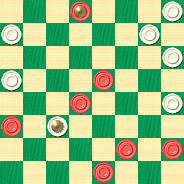 BLACK
Black to Play and Draw
BLACK
Black to Play and Draw
B:W29,28,25,21,20,13,K11:BK31,18,15,12,6,5,2.

[Read More]
A Checker Wedding
It was Byron and Yvette's wedding day; they had waited the requisite year after their engagement and were anxious to finally be married. And so, on a beautiful summer day, they took their vows in a beautiful new church in downtown Denver.
A large tent had been set up on the lawn across from the church. The wedding reception would take place there. Many guests were in attendance from both families, some of them having traveled substantial distances.
One of the guests who had made such a long journey was Yvette's Uncle Harvey.
Now, as you will know if you've read our story about Yvette and Byron's engagement, Uncle Harvey was, well--- a little rigid in his ways. He was an expert checker player the author of a little instructional booklet called "Our Boys at Home." The booklet recommended checkers as the pastime of choice for young men (certainly not young ladies, who ought to be knitting or cooking), steering them away from all sorts of evil things, like going to baseball games or being out after dark.
Uncle Harvey, you may recall, felt that young women could determine if young men were suitable to "embark upon the sea of matrimony" by testing their character via games of checkers. (Uncle Harvey didn't explain how the young ladies could do this if they were knitting or cooking instead of playing checkers.)
Yvette did test Byron with a checker problem, but it was a test of character, not of checker knowledge, and Byron passed easily.
This did not satisify Uncle Harvey, and he told Yvette as much in every letter he wrote to his seemingly errant niece.
"Marry him if you must," he had said upon greeting her last week when he arrived at the Denver train depot, "but if the boy can't even play checkers properly, he's probably doing all sorts of bad things."
In fact, Byron worked very hard at his father's buggy business, although it must be said that he did at times go out at night and was quite guilty of playing baseball on some weekends.
But Yvette and Byron's happiness couldn't be diminished by Uncle Harvey's dissatisfaction; after all, he /did/ condescend to attend the wedding, coming all the way from Chicago to do so.
Everything was fine until the newlyweds, making their rounds at the reception, came to Uncle Harvey's table, where he was sitting with his wife, Mrs. Hopkins, and some other Chicago-area relatives.
"Congratulations, you two," he said. "It may not be a union that I would bless myself, but nonetheless I wish you well, even if the odds are not in your favor."
"Why Uncle Harvey, whatever do you mean?" Yvette exclaimed.
"You know what I mean, niece," Uncle Harvey said. "The young man was not tested properly. In a true trial, he would undoubtedly have failed."
"Uncle Harvey, Yvette did offer me a trial by checkers, and I passed the trial," objected Byron. He was starting to fidget a little. Yvette squeezed his arm as a sort of warning: best not to dispute with her Uncle.
"You did no such thing!" Uncle Harvey said. "Please do not claim a victory that you did not earn. My niece explained to me the circumstances of the trial, and you most certainly did not solve the problem she set before you. And pray do not ascribe failure to solve..."
"... to an error in the setting." Byron concluded the sentence for him. "I /have/ read that booklet of yours, you know."
Yvette glared at Byron, but it was too late.
"Is that how you speak to your elders and betters?" cried Uncle Harvey. "You, who play at baseball and are not home some nights, dare to mock my work and make light of the sound principles expounded within it?"
Byron waited for him to comment about children today having no respect. He didn't have to wait long.
"No respect, none at all, the younger generation is morally bankrupt, and no wonder, what with baseball games being played at night under electric lights and other such societal corruption!"
Yvette's fingers were digging into Byron's ribs, warning him again to back off before an irremediable breach occurred. Byron realized that he had best heed her warning, and attempted to become conciliatory.
"Uncle Harvey, perhaps you could teach me a bit about checkers so that you may become convinced of my worth and sincerity in becoming a member of your family. I did not intend to malign your excellent booklet and apologize to you."
In uttering these words, Byron did his best in managing not to look ill.
Uncle Harvey glowered, but he stopped his tirade. "Harrumph," he said, "maybe there is hope for you after all." He paused for a moment. "Well, then, I propose we contest a game of checkers straight away so that I can at least get a preliminary sense of your depth of character."
"Right now, Uncle?" Yvette said. "But we must visit with our guests...."
"Won't take long, my dear," Uncle Harvey said. "Your young man will be quickly defeated, I am certain. Then you may return to your visiting. Ten minutes should suffice. Allow your Uncle this small satisfaction, and allow your new husband the chance to show what stuff he's made from."
Yvette noticed that Uncle Harvey had a little trouble saying "husband" in reference to Byron. Oh well, let him have his wish. It was her duty as a niece.
"All right, Uncle," she said. "I have no doubt you will quickly prevail."
To no one's surprise, Uncle Harvey just happened to have a checker set handy. He quickly set up the board and pieces on the table and bade Byron to sit opposite him.
Now, Byron and Yvette shared a little secret. Byron, in an attempt to improve his mind, had been faithfully attending the local checker club ever since his engagement to Yvette. For the past year, he had played and studied checkers with a level of dedication and commitment that surprised himself as much as anyone else. The players at the club had remarked at his enormous progress over the course of the year.
Yvette had wanted to tell Uncle Harvey about this, but Byron had begged her not to, saying that he wanted to be accepted on his own merits, and not just because he had a newly found interest in checkers.
This game with Uncle Harvey was definitely going to be interesting.
Uncle Harvey took the Blacks and made the first move.
"There," he said, "I have deliberately chosen the weakest opening move in order to give you more opportunity."
| 1. | ... | 24-19 |
| 2. | 6-9 | 28-24 |
| 3. | 11-15 | 22-17 |
| 4. | 13-22 | 25-11 |
| 5. | 8-15 | 21-17 |
| 6. | 9-14 | 17-13 |
| 7. | 4-8 | 29-25 |
| 8. | 8-11 | 25-21 |
| 9. | 5-9 |
"Why Uncle," said Byron, "should you not have instead played 15-18? Is 5-9 not a bit unusual?"
Uncle Harvey gave Byron a "how would you know" look but said nothing.
| 9. | ... | 13-6 |
| 10. | 2-9 | 26-22 |
| 11. | 1-5 | |
"Oh, Uncle," Byron said, "surely you did that on purpose to find out if I can win the game, for your move most definitely loses. Would not 9-13 have been the proper play?"
Uncle Harvey harrumphed, not once but twice. "What are you saying, boy? I have made a fine move. Fine move, I say."
By now the game had drawn quite a few bystanders and observers, several of them keen checker players in their own right. Several whispered side conversations were going on.
Byron's time at the checker club and with his checker books had not been for naught. He had a win on the board, and he knew it.
BLACK
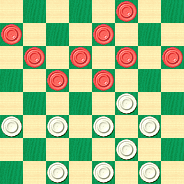 WHITE
White to Play and Win
WHITE
White to Play and Win
W:W32,31,30,27,24,23,22,21,19:B15,14,12,11,10,9,7,5,3.
Byron seems pretty confident. Can you find the win that he sees here? When you've solved the problem, click on Read More for the solution and the conclusion to our story.
[Read More]
This Way or That Way
Sometimes you have to choose, and the choice isn't always an easy one. This way or that way?
A checker choice that often occurs is "jump this way" or "jump that way" and sometimes the game hangs in the balance. Let's look at the following run-up.
10-14 24-19 11-16 28-24 7-10 22-17 9-13 25-22 5-9 30-25---A 16-20---B 32-28 2-7---C 19-15 10x19 17x10 7x14 (see diagram).
A---Very weak; 24-20 is better.
B---In the original annotations, this move was flagged as the probable losing move; in fact, it's potentially a winning move! However, it takes pretty deep computer analysis to show this.
C---This gives the advantage over to White, while 8-11 would have kept a strong Black lead.
BLACK
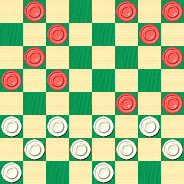 WHITE
White to Play, What Result?
WHITE
White to Play, What Result?
W:W31,29,28,27,26,25,24,23,22,21:B20,19,14,13,12,9,8,6,4,3,1.
White has a choice of jumps. Which is best--- if indeed one is better than the other--- and what result can be expected?
We are obligated to warn our readers that this one is as interesting as it is difficult, and the full solution will probably only be found by top players. But the rest of us can benefit from trying our hand at it. Such practical situations come up all the time.
Make your decision and then click on Read More for the solution and additional analysis.
[Read More]
Marvin Opens the Season
It was the opening day of the summer season. Marvin J. Mavin, captain of the National Checker League's Detroit Doublejumpers, had lead his team to a second-place finish in the winter season, and was hoping to go all the way this time. The opener was taking place on the road, with the Doublejumpers facing the Pittsburgh Paisleys in the first game of a four-game series.
 Marvin J. Mavin
Marvin J. Mavin
Marvin learned a hard lesson during his exile to the minor leagues (see previous Checker Maven column), and had laid off the beer during the playing season. Unfortunately, his girlfriend Priscilla had been away on business in Turkmenistan during the inter-season break, and absent her watchful eye Marvin had backslid--- more than a little.
In short, Marvin wasn't quite in the best condition for today's match. And he had to face the Paisleys' top player, Karl "the Mauler" Mortenson. The two sat facing each other over the board in the center of the huge stadium, which was packed with fervent checker fans eager for the start of the new season. The National Anthem was played and the players took their seats. Marvin and Karl shook hands. Karl gave Marvin his signature "Pittsburgh Can Crusher" handshake, and it was all Marvin could do not to howl with pain. "Hey, man, that's the hand I move the pieces with," he said, "lay off a little." But Karl just grinned and said something about sissies and wusses.
But then, accompanied by a great cheer from the crowd, the match began.
 Karl "the Mauler" Mortenson
Karl "the Mauler" Mortenson
Black: Karl Mortenson
White: Marvin J. Mavin
| 1. | 9-14 | 22-18 |
| 2. | 5-9 | 24-19 |
| 3. | 11-15 | 18x11 |
| 4. | 8x24 | 28x19 |
| 5. | 4-8 | 25-22 |
| 6. | 8-11 | 22-18 |
| 7. | 11-16 | 29-25 |
| 8. | 7-11 | 25-22 |
| 9. | 10-15 | 19x10 |
| 10. | 6x15 | 27-24 |
| 11. | 16-20 | 23-19 |
| 12. | 20x27 |
"Big bad dude doesn't know book play," Marvin muttered. Indeed, while the text move is fine, 14-23 is usual. "Yeah, well I know a few new tricks, wussie," Karl growled back.
| 12. | ... | 19x10 |
| 13. | 14x23 | 26x19 |
| 14. | 9-13 | 31x24 |
| 15. | 2-7 | 30-26 |
| 16. | 7x14 | 26-23 |
| 17. | 3-7 | 24-20 |
| 18. | 7-10 | 32-28 |
Marvin was sweating, and his head was pounding; he was regretting the excesses of the past week. If he lost today, Priscilla would instantly realize that he had gone off the wagon, and when she returned home she would show him no mercy.
| 19. | 1-5 | 22-18 |
| 20. | 5-9 | 28-24 |
| 21. | 13-17 |
"Take that, you wimp," Karl said. "You're dead meat, little boy."
Marvin knew he was in tough straits. Every move on the board seemed to lose two men. He had to pull out a draw, not only to save the game, but to save his hide. Karl thought he was some kind of tough guy, but Marvin knew that you haven't seen tough until you've been on the wrong side of Priscilla.
BLACK
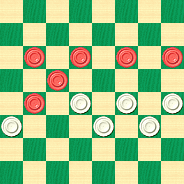 WHITE
White to Play and Draw
WHITE
White to Play and Draw
W:W24,23,21,20,19,18:B17,14,12,11,10,9.
Can you find the draw here, or would you too face the equivalent of Priscilla's wrath? All we can say is that we think it might be best to solve the problem! Find the draw and then click on Read More to see the solution and the rest of our story.
[Read More]
A Dishpan Move
We've heard various names given to a losing move in a checker match; these epithets range from the rather mild "unfortunate" to the somewhat stronger "poor" and on up from there to other things that we certainly won't print here.
In the following game, played in the early 1930s between very strong players, such a move was made. When the game was published, the losing choice was called a "dishpan" move, a term which we hadn't heard before. It's an amusing and appropriate choice of words. Let's have a look at the game in question.
9-13 24-20 5-9 22-18 10-15---A 25-22 6-10 27-24---B 10-14 22-17 13x22 26x10 7x14---C 30-26 15x22 26x10 2-7 10-6 1x10 29-25 10-15 23-19 9-13 19x10 7x14 24-19 3-7---D
A---10-14 is often played instead; there is little difference.
B---28-24 is just as good.
C---15-22 same.
D---It was textbook play up to this point. The original editor called this a "hasty dishpan move" noting that the player "must have eaten too much for dinner."
BLACK
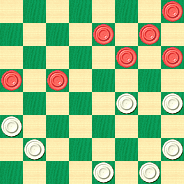 WHITE
White to Play and Win
WHITE
White to Play and Win
W:W32,31,28,25,21,20,19:B14,13,12,11,8,7,4.
Will this one wash, or will this position "sink" you? Find the win for White, and while you're at it, correct Black's losing "dishpan" move. When you're done, clicking on Read More will bring you cleanly to the solution.
[Read More]
Down On The Farm (Team)
Marvin J. Mavin found himself at Fifty-Third Stadium in Comstock Park, Michigan, playing fifth board for the West Michigan Wompers in a matchup with the Great Lakes Glommers, in the single A Midwest League.
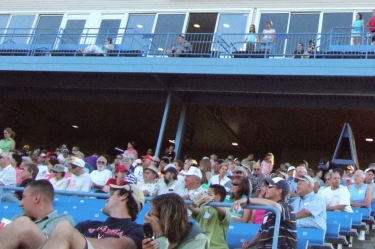
Checker Fans at Fifty-Third Stadium, Comstock Park, Michigan
Yes, that's fifth board and Single A. Just how such a turn of events came about is a bit of a story.

Marvin J. Mavin
It all started when Marvin, the usual Captain and first board player for the Detroit Doublejumpers, an outstanding Major League team, was called into the team manager's office. The manager, tired of Marvin embarrassing the team with his beer-drinking antics, was in the mood of teaching Marvin a lesson. But Marvin had been foolish enough to have had a couple of beers at lunch and started calling his boss a few uncomplimentary names as the boss was attempting to lay down the law.
That's when the manager drew the line. No one, even a star player, had the right to be insubordinate and rude, much less engage in behavior that provided a bad example to the team's younger fans. The manager decided that Marvin should be sent down, not even to the AAA or AA level of Detroit's farm team system, but all the way to the Single A level, giving him time to contemplate the error of his ways. To further ensure that Marvin got the message, he was to play fifth board--- the lowest slot on the team.
Marvin, to say the least, was not very happy. That, his manager told him, was exactly the point. Furthermore, Marvin would remain with the farm team until he improved both his attitude and behavior, or lacking that, was fired altogether.
"You have no more than a month to shape up," the manager said, "or your career in professional checkers is over."
And so Marvin was sitting across the board from Chester Schlockovitz, fifth board player for the Glommers. Chester was a nice enough old guy. He had never risen higher than Single A checkers but somehow had hung on for 35 years or so in the lower rungs of the professional ranks. He wasn't a has-been so much as a never-been, but you had to admire his persistence.
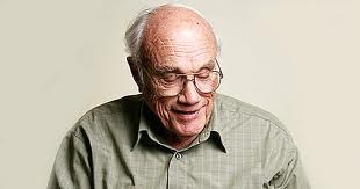
Chester Schlockovitz
Marvin, to his chagrin, was being made to pass a breathalyzer test before each game to ensure that he had been staying away from the beer. The coach of the Wompers, Thaddeus Twizzler, was strict with the players and Marvin's superstar status didn't earn him any slack in Thaddeus's eyes. Marvin would follow the rules just like anyone else and that meant no drinking during the playing season, period. Thaddeus was adamant. "Drinking ain't never done no one no good, and they sure don't play checkers right if'n they do drink," he would often say.

Thaddeus Twizzler
So here Marvin was, facing Chester over the board. "Nice afternoon, city boy," Chester said, "reckon you can beat me at this here game?" It was clear that Chester, in his plain-speaking manner, meant this as a friendly sort of challenge.
Marvin didn't reply; the starting whistle had blown, and Chester, playing Black, fell silent and made his first move. The game played out as shown below.
| BLACK | WHITE |
| Chester | Marvin |
| 1. | 9-13 | 22-18 |
| 2. | 12-16 | 24-20 |
| 3. | 8-12 | 28-24 |
| 4. | 4-8 | 18-14 |
| 5. | 10x17 | 21x14 |
| 6. | 16-19 | 24x15 |
| 7. | 11x18 | 26-22 |
| 8. | 7-11 | 22x15 |
| 9. | 11x18 | 14-10 |
| 10. | 6x15 | 23x14 |
| 11. | 3-7 | 25-22 |
| 12. | 1-6 | 22-17 |
| 13. | 13x22 | 31-26 |
| 14. | 22x31 | 32-28 |
| 15. | 31x24 | 28x3 |
"Well, how d'ya like them apples!" Chester chuckled cheerfully. "You ain't a bad player for one a them there city fellas!"
| 16. | 6-9 | 14-10 |
| 17. | 9-14 | 29-25 |
| 18. | 5-9 | 20-16 |
| 19. | 12x19 | 3x12 |
| 20. | 19-23 | 12-16 |
| 21. | 23-27 | 16-19 |
| 22. | 27-31? |
Marvin, in a brief moment of feeling, looked over at Chester with a sad expression. Chester had played a fine game up to this point, but it was moves such as this that separated the Major Leaguers from the also-rans. Marvin now had a clear win, and he knew it.
BLACK (Chester)
 WHITE (Marvin)
White to Play and Win.
WHITE (Marvin)
White to Play and Win.
W:W30,25,K19,10:BK31,14,9,2.
Can you match wits with Marvin and find the win, or will you be sent down to the farm team too? Give it your best--- your professional checker career may depend on it--- and then click on Read More to see the solution and the rest of the story. While you're at it, correct Chester's losing move, too.
[Read More]
Marvin Meets Mary
A huge crowd had gathered at Manhattan Square Garden to see the National Checker League match between the Detroit Doublejumpers and the New York Draughtsmen, two of the top teams in the league. The Doublejumpers would be lead as usual by their intrepid captain, Marvin J. Mavin.
 Marvin J. Mavin
Marvin J. Mavin
But what was not so usual is that the Draughtmen would be lead by an incredible young checker prodigy, who had recently burst upon the scene, turning pro at the age of 17 and moving at once to the top ranks: Marvin tonight would face checker sensation Mary Baloner.
 Mary Baloner
Mary Baloner
Marvin was more than a little put out. "A teenage girl for crying out loud!" he muttered, but not very loudly; he had been warned by his management that comments about age or gender were completely out of place, as checkers was a democratic sport open to all based solely on ability. Still, Marvin really, really wanted to win tonight.
"She's not even old enough to drink beer!" he said, but again, not loudly enough to be heard.
And now, there she was, standing opposite him as the last strains of the National Anthem echoed through the arena.
"Hey, Mavstah!" she exclaimed as they took their seats and waited for the arena announcer to introduce the teams and players. "Whaddya think about playin' a itsy-bitsy little girl, huh? Yeah, I know whatcha think. But youse gonna get your---" But before she could describe what was going to happen to Marvin, the announcer introduced them, and then the referee signaled for the games to start.
Mary gave Marvin a wink and a grin and made her first move, and the teams settled down to their play.
| Black | White |
| Mary | Marvin |
| 11-15 | 23-19 |
| 9-13 | 26-23 |
| 6-9 | 23-18 |
After Marvin made this move, Mary looked quite surprised. She looked up at him and said, "Oh, a wise guy, is ya, Mavhstah? A normal playah woulda played 22-18 but you ain't normal, is ya?" And then she laughed and turned her attention back to the checkerboard.
But Marvin thought he knew what he was doing. Despite Mary's superstar status, he knew that she wouldn't have experience in many of the offbeat lines of play, and he thought to get an advantage by taking the game into less familiar territory.
| 10-14 | 19-10 |
| 14-23 | 27-18 |
| 7-23 | 31-27 |
| 12-16 | 27-18 |
| 3-7 | 32-27 |
| 7-10 | 22-17 |
| 13-22 | 30-26 |
| 22-31 | 18-15 |
| 10-19 | 24-15 |
| 31-24 | 28-3 |
"Heh, heh, heh, fancy-schmancy," Mary said. "But I seen it all comin'."
| 9-14 | 15-11 |
| 5-9 | 25-22 |
| 9-13 | 3-8 |
| 14-18 | 22-15 |
| 2-7 | 11-2 |
| 4-18 | 2-7 |
Mary looked up at Marvin once again. "I thought youse was gonna play 29-25, Mahvstah. Whaddya doin, tryin ta confuse me or sumthin? Well it ain't gonna work against Mary Baloner!"
Marvin didn't reply. Was he holding his breath a little, waiting to see how Mary would respond to this move?
Marvin breathed a sigh of relief and spoke for the first time during the game. "Well, little Missy, you may think you are some sort of checker rock star, but this game is mine."
Now it was Mary's turn to be silent, a look of consternation gathering on her face as Marvin made his next move.
BLACK
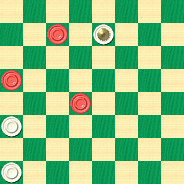 WHITE
White to Play and Win
WHITE
White to Play and Win
W:W29,21,K7:B18,13,6.
Can you beat Mary at her own game, so to speak? Do you know what move she should have played to hold the draw? See if you're as good as Marvin; find the winning move, and fix Mary's unfortunate error while you're at it. Then click on Read More to see the solution and the conclusion of our story.
[Read More]
Pages: «Prev
|
1 |
2 |
3 |
4 |
5 |
Next»
The Checker Maven is produced at editorial offices in Honolulu, Hawai`i, as a completely non-commercial public service from which no profit is obtained or sought. Original material is Copyright © 2004-2024 Avi Gobbler Publishing. Other material is the property of the respective owners. Information presented on this site is offered as-is, at no cost, and bears no express or implied warranty as to accuracy or usability. You agree that you use such information entirely at your own risk. No liabilities of any kind under any legal theory whatsoever are accepted. The Checker Maven is dedicated to the memory of Mr. Bob Newell, Sr.


![]()




![]()
